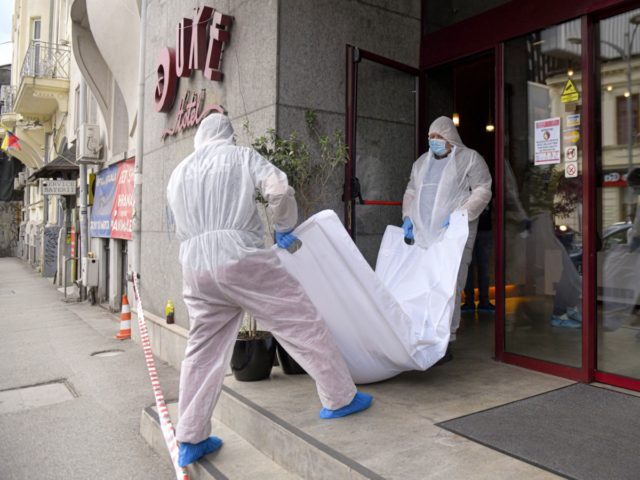Paris (AFP) — The unexplained death of a fugitive Iranian judge, who plunged from a top floor of his hotel in Bucharest last week, has infuriated activists who say a rare chance has been missed to bring a senior Iranian official to justice over alleged rights violations.
Gholamreza Mansouri’s body was found by Romanian police on June 19, with the possibility of suicide so far their only lead, according to a police source.
But activists are furious that such a significant figure had not been held in custody to face eventual justice — and for his own protection.
Mansouri, 52, was wanted by Tehran on accusations he took a 500,000-euro ($560,000) bribe, part of a high-profile case that has seen 22 people go on trial, including former senior judiciary official Akbar Tabari.
Mansouri had fled Iran last year, first going to Germany and then moving on to Romania, and was the subject of an Iranian arrest warrant.
He was initially arrested by Romanian authorities for extradition but then allowed to go free under judicial supervision.
But activists in Europe also wanted him investigated for rights violations while in his post, which focused on culture and media cases.
The Paris-based press freedom group Reporters Without Borders (RSF) filed a complaint against him with prosecutors in Germany on June 11 — and then two days later in Romania, when he moved there — alleging he was responsible for the persecution, detention and torture of Iranian journalists in a notorious 2013 crackdown.
“The facts against him were massive,” said Antoine Bernard, senior advisor on international strategic litigation with RSF, adding that there was a strong basis in both German and Romanian law to file the complaints.
He said the group had the testimony of 20 Iranian journalists accusing Mansouri of arbitrary arrest and detention, and treatment that was “at the very least inhumane and degrading and involved torture.”
He told AFP that RSF was “outraged” by his death as well as the decision of the Romanian authorities not to detain Mansouri “for the sake of his own protection against any Iranian threat and against himself.”
– ‘Entire system on trial’ –
The Justice for Iran NGO said it had made an appeal for witnesses to come forward after it emerged that Mansouri was in Europe.
It had already collected testimony from eight people who said they were the judge’s victims.
“Beyond reasonable doubt, I can confirm that Mansouri was responsible for several arbitrary arrests and detention, usually in solitary confinement, the closing down of online businesses and start-ups, and the persecution of the families of journalists and media activists,” the group’s executive director Shadi Sadr said.
But she told AFP it had not received evidence he was responsible for torture or other crimes that could see him face trial in Germany or Romania under universal jurisdiction, where one state prosecutes a defendant for a crime committed on another foreign territory.
This, Sadr said, highlighted the difficulties faced by victims hoping to find justice abroad, “where there is little room for criminal prosecution.”
Kaveh Moussavi, a British lawyer who played an instrumental role in the arrest of a former Iranian prosecutor in Sweden last year on charges of involvement in the mass executions of prisoners in the late 1980s, said it was “extremely frustrating that he (Mansouri) slipped the net.”
Moussavi had been building a case against Mansouri based on charges he had “held hostage” in prison the family of Saeed Karimian, founder of the Istanbul-based Persian satellite television network Gem TV, who was gunned down in the Turkish city in 2017.
“Had we been able to bring him back and put him on trial… I am pretty sure we would have convicted him,” Moussavi said.
“If we had convicted this man, not a single member of the Iranian judiciary would have been able to step into the EU after that,” he said.
“We lost the chance of putting the entire Iranian judicial system on trial.”
– ‘Domino effect’ –
The principle of universal jurisdiction has gained prominence in recent years, in particular with the civil war in Syria that has resulted in both oppressors and victims becoming refugees in Europe.
Two alleged former Syrian intelligence officers went on trial in Germany in April on charges of crimes against humanity in the first-ever court case over claims of state-sponsored torture by President Bashar al-Assad’s government.
RSF vowed that Mansouri’s death — whatever its cause — would not deter the group from pursuing other alleged rights violators from Iran and elsewhere.
“We urge prosecutors to move much faster when such situations do occur,” Bernard said.
For Sadr, the biggest loss from Mansouri’s death was the chance to hear how Iran’s system works from a figure who was at its heart.
“If he had remained in Europe and spoken out, Mansouri would have become someone whose confessions would have had a massive domino effect on other perpetrators to disclose information in response,” she said.

COMMENTS
Please let us know if you're having issues with commenting.